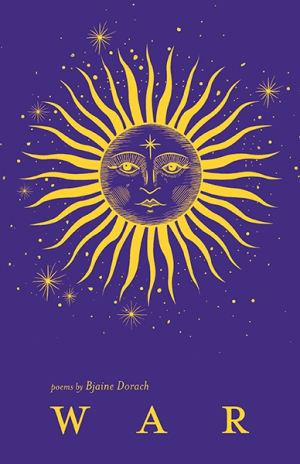War
War is a poetic meditation on the psyche, an exploration and expectoration of what’s negative.
Written in the moment and not initially intended for release, the poems of Bjaine Dorach’s War are a glimpse into the recesses of the mind. All of the dark thoughts, feelings, and emotions considered improper or unshareable are here. Anger, frustration, and jealousy are tempered with the knowledge that, to move past negativity, it must first be acknowledged and allowed space. There are no easy answers here, and the darkness is uncomfortable, but to pass through it is to overcome and be at peace with it.
This collection is full. Full of life, full of vigor, full of melancholy, full of introspection. In this fullness, a state of being is reflected—the state of being both in motion and at rest, of being an observer and a participant. There is pain here, as well: the pain of lovers leaving, of death. There is blood and sickness and anguish and fear. Though all the poems contain some or all of these, “Not Here” is a collection standout that encapsulates deep fear and anxiety:
Please don’t bring me here, not again.
The trying days and tempered nights (clinging to my skin).
Bring face to my reality, and shame to the earth that owns me.
Cover me up tight and seal me (skin to my bone).
Take me home please.
With a majority of its poems spanning six lines or less, word choices are an essential tool. Some poems are straightforward. They are pleas and recriminations, memories and wishes with just an edge of anger. “Home” is like that, starting with “where i went / where i go / where there’s trouble” and setting a scene that can only be less than positive. Other poems are less straightforward, but no less compelling. They are observations of the dark corners of the mind, begging any light to shine. “Bedroom Dream” and “Bedtime Stories,” among the longer poems, evoke this feeling, but in different ways. “Bedroom Dream” envisions a character locked away in a prison of one. “Bedtime Stories” finds this character free from the prison, but in such a state of brokenness that they must “glue strength to my consciousness.”
Line drawings of mandalas and the tree of life separate the collection into sections. Without headings, it is left to the poems themselves to dictate the theme of the sections. Parentheticals within poems suggest a conversation between life, death, and the poetic characters. The line drawings, then, act as momentary breaks in the conversation while interlocutors prepare for their next dialogues. There is no artifice here, no hidden meanings. Multilayered as these poems are, they are not incomprehensible. Spanning thirty years of writing, Dorach’s collection is timeless and universal.
War is a poetic meditation on the psyche, an exploration and expectoration of what’s negative.
Reviewed by
Dontaná McPherson-Joseph
Disclosure: This article is not an endorsement, but a review. The publisher of this book provided free copies of the book and paid a small fee to have their book reviewed by a professional reviewer. Foreword Reviews and Clarion Reviews make no guarantee that the publisher will receive a positive review. Foreword Magazine, Inc. is disclosing this in accordance with the Federal Trade Commission’s 16 CFR, Part 255.


